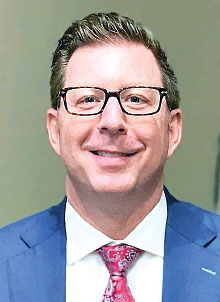In April, the Supreme Court ruled that states are not constitutionally required to allow defendants to plead not guilty by reason of insanity. That means now, without an overarching national requirement that states have a meaningful insanity defense, state-level advocacy is more important than ever, said Trent Holmberg, M.D., an adult and forensic psychiatrist in Utah and president of the Utah Psychiatric Association.
Utah is one of the four states without a traditional insanity defense, along with Kansas, Idaho, and Montana. For the past two years, Holmberg has helped fight to change that in Utah, but legislation that would have done so has so far been unsuccessful.
In the case, Kahler v. Kansas, Justice Elena Kagan wrote the majority opinion in which the court sided with Kansas. “No insanity rule in this country’s heritage or history was ever so settled as to tie a State’s hands centuries later,” Kagan wrote. The choice over whether to allow an insanity defense is a choice “for Kansas to make—and, if it wishes, to remake and remake again as the future unfolds.”
“We were always hopeful the Supreme Court would make the states change, but my argument for the last two years has been: Do we really want to wait around for the Supreme Court to tell us our law is unconstitutional?” Holmberg said.
Now that the Supreme Court has ruled that it is not going to step in, Holmberg said, psychiatrists must get involved in state-level advocacy to share their expertise on this topic for the benefit of their patients.
Holmberg has been conducting forensic evaluations for almost 20 years. “I’m close enough to the situation that I know there are cases in which what the person did was not [his or her] fault. It was a product of the person’s mental illness,” he said. “When people are sick and do something that’s out of their control, they shouldn’t be held morally responsible. That’s been the traditional way we’ve approached lawmaking and crime and punishment since Medieval times.”
Often, family members—who are frequently the victims of the alleged crime—ask that their loved one who is being charged be sent to a psychiatric hospital, rather than to a prison, where they may be abused or not receive proper care, he said. Yet the state says no. “What’s frustrating about working and living in one of these states without a traditional defense is that we see this situation over and over,” Holmberg said.
But it’s not just those four states without traditional insanity defenses that must prepare to advocate. Utah’s attorney general wrote an amicus brief in the Supreme Court case arguing that states should not be required to have a traditional insanity defense. Fifteen other states signed on to the brief: Alabama, Alaska, Arkansas, Florida, Georgia, Idaho, Indiana, Louisiana, Missouri, Montana, Nebraska, Ohio, Oklahoma, South Carolina, and Texas.
Thirteen of those states have traditional insanity defenses. Holmberg said his concern is that those states will now attempt to abolish their defenses. “The only solution to that is to fight it out state by state and try to do something that is meaningful for patients with mental illness,” he said.
Going forward, he urged psychiatrists in other states, especially those that signed onto the brief, to pay careful attention to what their legislatures and governments are doing related to the insanity defense. He and other advocates were unaware that Utah’s attorney general would be filing the amicus brief until after the fact.
“If other states propose laws to abolish the defense, I could see them passing unless we really get into organized, grassroots opposition and educate people that mental illness can drive behavior. We need to have a way to address these situations,” he said. ■

